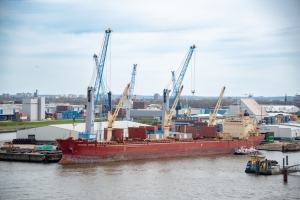


(Posted on 23/05/23)
The problematic trend in the world economy is affecting Port of Hamburg throughput figures. As in other ports of Northern Europe, seaborne cargo throughput is falling, yet the trend in certain sea trades is positive. As an all-purpose port, Hamburg is profiting from a rise in bulk cargo handling.
As elsewhere, in the Port of Hamburg seaborne cargo throughput for its terminals is currently subject to a challenging economic environment. Persistent geopolitical tension, EU economic sanctions against Russia, high inflation, global reluctance to make purchases and massive warehouse stocks are restraining cargo handling in European ports. In these aggravated conditions, with seaborne cargo throughput of 28.1 million tons in the first quarter of 2023, down 10.2 percent on the same period of the previous year, Germany’s largest post succeeded in maintaining throughput volume at the same level as the final quarter of last year. Container throughput at 18.6 million tons was 15.9 percent lower than in the same period of the previous year, with the total of 1.9 million TEU being 16.9 percent down.
Axel Mattern, CEO of HHM - Port of Hamburg Marketing, stressed that “The tough general economic situation is reflected in current throughput figures for all North Range ports. Among these competitors, Hamburg lies here in mid-field. When comparing quarterly returns for the current and last years, it needs to be remembered that at the beginning of last year, Russia was still the Port of Hamburg’s fourth largest trading partner. Sanctions came into force after the invasion of Ukraine, as is noticeable in this comparison – freight volumes to and from Russia are now missing from the general view. In addition, the at times unstable economic situation in China on account of the pandemic has continued into this year. Neither of these factors were without repercussions on the Port of Hamburg.” Apart from developments in the European and world economies, the occurrence of strikes locally also impacted the Port of Hamburg’s annual result.
Up by 5.4 percent on the same period of last year, at 9.3 million tons the trend was also positive on bulk cargo handling in Hamburg. The best performer was the liquid cargo sector, with an increase of 12.3 percent. Imports of oil products rose by 27.4 percent. Since existing handling capacities facilitated import and further transport of energy sources required at short notice, the port contributed to the reliability of energy supplies. The agribulk sector also grew. Higher exports of grain and feedstuffs, along with higher imports of oleaginous fruits, fuelled an 11.8 percent growth to 1.8 million tons. Grab cargo throughput was almost unchanged on the first quarter of the previous year.With handling at 152,000 TEU, up 9.5 percent on the previous year, the USA trades remain a positive feature of seaborne container transport via the Port of Hamburg, with the United States continuing to fill second place after China among the Port of Hamburg’s top trading partners. With 31.7 percent growth to 52,000 TEU meanwhile, trade with Canada also grew robustly.
During the first quarter, 11.6 million tons were transported to and from the hinterland by rail, or 3.4 percent less than in the same period the previous year. The Port’s hinterland infrastructure and intermodality proved factors vital for its resilience and adaptability as a hub.
For the remainder of the year, a recovery in Port of Hamburg throughput total may be expected. “During the first three months we had to report an extreme underlying trend statistically, with the very distinct difference in the background economic factors in the first quarters of the years 2022 and 2023. Multiple crises caused disruption of supply chains and weak economic growth. This has affected throughput,” explained Axel Mattern, HHM’s CEO.
With this year’s Rail Conference “Rail Freight Transport and Seaports”, a joint initiative... Read more
Asian Bulk Logistics (ABL Group) and ICG have jointly announced the successful completion of ABL&rsquo... Read more
Abu Dhabi based AD Ports Group, a leading global enabler of integrated trade, industry and logistics... Read more
The Executive Board of Hamburger Hafen und Logistik AG (HHLA) has appointed Patrick Krawutschke as Managing... Read more
Abu Dhabi based AD Ports Group, a global enabler of integrated trade, transport, industry, and logistics... Read more
This year marks a significant milestone in maritime innovation as Port Hedland, Australia, celebrates... Read more
Associated British Ports (ABP), the UK’s leading port operator, has announced the latest tranche... Read more
During the Investment, Labour, and Trade Promotion Programme in Japan (November 16–22, 2025),... Read more
AD Ports Group subsidiary Khalifa Economic Zones Abu Dhabi - KEZAD Group, the largest operator of integrated... Read more
Abu Dhabi based AD Ports Group, a global enabler of integrated trade, transport, industry, and logistics... Read more